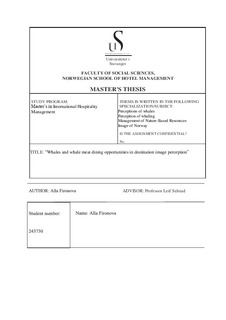| dc.description.abstract | The current study aimed to have an overlook of people’s online expressions of their attitudes and perceptions towards whaling in Norway and of their views on whale meat as a traditional culinary experience, and whether those insights impact Norwegian destination image, as little research has formerly been done in this area. The decision-making process in traveling to the country is significantly influenced by the knowledge or the lack of it, values and available information about the destination. Norway is a unique example, where whale-watching, and whale preservation co-exist along with whaling. Norwegians do referrer to whale hunt as a coastal tradition, however, throughout the world this tradition is found to have no place to exist in the modern era. As a result, the theme of whales’ symbolism turned out to be extremely significant for studying whale and whaling perceptions. As whaling itself was strongly criticised and in the eyes of potential tourists it did not add to the cultural mosaic of Norway, the whale meat on the other hand was named as traditional and unique culinary experience. However, there is no evidence that this affects tourism in Norway, or to which extent. Research was conducted utilising Netnographic research method. Archival data was collected online and fieldnotes produced and researcher’s interpretation of the results was presented. The observations demonstrated that Norway is not as “popular” whaling country as two others, Iceland and Japan; it was also found that many people are not even aware of ongoing whaling in Norway. Additionally, there is a major concern about environmental issues and battles, concerning oil-drilling, plastic pollution and industrial overfishing, which in their turn affect well-being of the whales. Limitations and challenges were highlighted. Future research could be conducted in quantitative method. The study contributes to the understanding of the Norwegian whaling perception internationally and the role of whales in the environment protection battles. | nb_NO |
